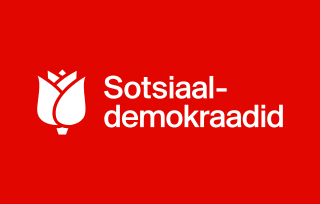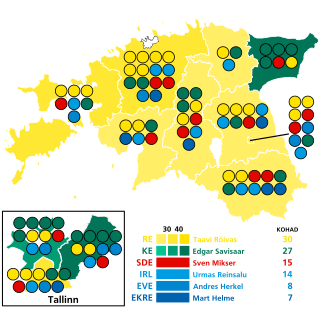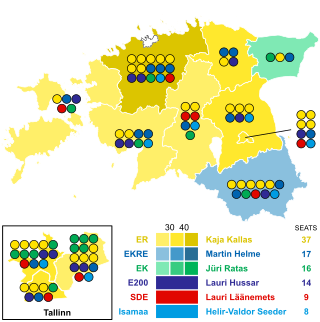 |
|---|
The National Liberal Party (Estonian : Rahvuslik Vabameelne Partei, RVP) was a political party in Estonia. [1]
 |
|---|
The National Liberal Party (Estonian : Rahvuslik Vabameelne Partei, RVP) was a political party in Estonia. [1]
The party was established by Johan Pitka in 1922 and ran in the 1923 parliamentary elections, winning four seats with 4% of the vote. The 1926 elections saw its vote share fall to just 1%, and the party lost all four seats. It did not contest national elections again. [2]

The Estonian Centre Party is a populist political party in Estonia. It was founded in 1991 as a direct successor of the Popular Front of Estonia, and it is currently led by Mihhail Kõlvart.

The 1923 United Kingdom general election was held on Thursday 6 December 1923. The Conservatives, led by Prime Minister Stanley Baldwin, won the most seats, but Labour, led by Ramsay MacDonald, and H. H. Asquith's reunited Liberal Party gained enough seats to produce a hung parliament. It is the most recent UK general election in which a third party won over 100 seats and the most narrow gap, of a "mere" 100 seats, between the first and third parties since. The Liberals' percentage of the vote, 29.7%, trailed Labour's by only one percentage point and has not been exceeded by a third party at any general election since.

The Social Democratic Party is a centre-left political party in Estonia. It is currently led by Lauri Läänemets. The party was formerly known as the Moderate People's Party. The SDE has been a member of the Party of European Socialists since 16 May 2003 and was a member of the Socialist International from November 1990 to 2017. It is orientated towards the principles of social-democracy, and it supports Estonia's membership in the European Union. From April 2023, the party has been a junior coalition partner in the third Kallas government.
Estonia elects a legislature on the national level. The Riigikogu has 101 members, elected for a four-year term by proportional representation with a 5% electoral threshold. A head of state – the president – is elected for a five-year term by parliament or an electoral college. Locally, Estonia elects local government councils, which vary in size. Election law states the minimum size of a council depending on the size of municipality. Local government councils are elected by proportional representation too.

The Party of Estonian Christian Democrats, formerly known as the Estonian Christian People's Party was a political party in Estonia, which is not represented in the Riigikogu (parliament). In 2012, the party was declared bankrupt by a court, therefore it cannot participate in elections.
The Russian Party in Estonia was a minor centre-left political party in Estonia.
An election for Members of the European Parliament from Estonia to the European Parliament was held on 7 June 2009.

A parliamentary election was held in Estonia on 6 March 2011, with e-voting between 24 February and 2 March 2011. The newly elected 101 members of the 12th Riigikogu assembled at Toompea Castle in Tallinn within ten days of the election. The incumbent government of the Reform Party and IRL continued in office until 2014 when Prime Minister Andrus Ansip resigned, ending his tenure as the longest-serving Prime Minister in contemporary Estonian history. He was replaced by Taavi Rõivas who formed a new coalition government with SDE. The Riigikogu elected after this election was the least fragmented in Estonian history, featuring only four parties.
Pro Patria National Coalition Party was an Estonian political party founded in 1992. In 1995, it merged with the Estonian National Independence Party into Pro Patria Union.
The Estonian Labour Party was a political party in Estonia. It was formed in 1919 by a merger of the Radical Socialist Party and the Social Travaillist Party, and ceased to exist in 1932, when it merged with other centrist parties to form the National Centre Party. It was a member of government coalitions between 1919 and 1925, and again from 1927 until 1931.
The Estonian People's Party was a centre-right political party in Estonia.

The Farmers' Assemblies was a conservative political party in Estonia. Led by Konstantin Päts, it was one of the ruling parties during most of the interwar period.
The Christian People's Party was a political party in Estonia between 1919 and 1931.
The German-Baltic Party was a political party in Estonia representing the German minority.
The Economic Group was a political party in Estonia.
The Settlers' Party was a political party in Estonia.
The Landlords' Party, also known as the House Owners' Party, was a political party in Estonia.
The Tenants' Union was a political party in Estonia.

Parliamentary elections were held in Estonia on 1 March 2015. Advance voting was held between 19 and 25 February with a turnout of 33 percent. The Reform Party remained the largest in the Riigikogu, winning 30 of the 101 seats. Its leader, Taavi Rõivas, remained Prime Minister. The newly elected 101 members of the 13th Riigikogu assembled at Toompea Castle in Tallinn within ten days of the election. Two political newcomers, the Free Party and the Conservative People's Party (EKRE) crossed the threshold to enter the Riigikogu.

Parliamentary elections were held in Estonia on 5 March 2023 to elect all 101 members of the Riigikogu. The officially published election data indicate the victory of the Reform Party, which won 37 seats in total, while the Conservative People's Party of Estonia (EKRE) placed second with 17 seats. The Centre Party won 16 seats, a loss of 10, while Estonia 200 won 14 seats, gaining representation in the Riigikogu.